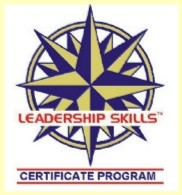|
|
|||||||||||||||
|
Updated 6/01/10 |
|||||||||||||||
|
|
||||||||||||
|
The Leadership Skills Certificate is awarded for the satisfactory completion of 42 hours of classroom training (usually 12 half-day modules, including four required “core” modules), plus a passing score on the Certificate Exam (an “open materials” examination to acknowledge the participant’s existing skills and experience, and to confirm that newly learned skills are understood and applied on the job). Certificate Program materials include PowerPoint slides, learning instruments, and in-class exercises for each module, plus a comprehensive CD-ROM containing 18 fully-searchable reference texts and dozens of articles, forms, assessment tools, and worksheets to enhance the learning experience long after the training sessions are over. |
|
The Leadership Skills Curriculum |
|
Note: Courses offerings, module titles, and registration fees may vary slightly from city to city. Please contact your local sponsoring organization (or send us an e-mail), to receive a current schedule and enrollment information for your area. |
|
Unit 1 - Leadership Fundamentals Module A. The Role and Functions of a Leader (core/required) These four half-day courses are designed to present the foundation models and processes that are required for effective leadership - with special emphasis on skills and proficiencies that are not typically needed or developed until a person is called upon to fill a formal or informal leadership role. |
|
Unit 2 - Communications Skills Module A. Active Listening and Interaction Skills (core/required) These six half-day courses are designed to present the knowledge, skills, and step-by-step processes that are required to excel at various forms of interpersonal communication, with special emphasis on the situations and competencies that are critical for anyone in a formal or informal leadership role. |
|
Unit 3 - Performance Management Module A. Interviewing and Hiring Building on the Leadership Fundamentals and Communication Skills presented in the first two units, this series is the “heart” of the program for most people in formal leadership roles. It presents performance management as a continuing cycle of actions and conversations between the leader and follower. Each module offers proven “how to” methods for having these conversations with employees at varying levels of competence and commitment in ways that generate peak performance. |
|
Unit 4 - Team Leadership Module A. Creating and Sponsoring Teams While Unit 3 (above) teaches leaders how to develop competence and commitment in each individual, these four half-day courses focus on the skills and tasks required to successfully establish a new team, get team members to work together, and deal effectively with the problems and issues that naturally arise when people are working in groups. The techniques presented in this series are applicable to leaders without formal authority, as well as those in actual management positions. |
|
Unit 5 - Workplace Issues Module A. Employment Law for Leaders A company’s legal, ethical, and financial obligations toward its employees, customers, and other stakeholders is often based on whether the company knew, or should have known, about a potential problem - and took the appropriate actions to correct it. What many supervisors and managers fail to realize is that, from a legal perspective, anyone in a formal leadership position IS the company. These five courses, co-presented with an employment law attorney, are designed to help existing and prospective members of management to create and maintain a work environment that is safe, fair, productive, and fun. |
|
Unit 6 - Project Management Module A. Project Management Basics As local and global marketplaces demand more specialized products and services, repetitive work tasks and standardized processes are being replaced with a “project” approach to meeting the needs and expectations of internal and external customers. This series provides the unique skills (fully aligned with PMI’s Project Management Body of Knowledge) to successfully lead a project, identify and resolve operational problems, and improve work processes. |
|
This program may also be customized and presented at your organization. Click for more info . . . |
|||
|
Doug Heatherly, Ph.D. Doug@DHeatherly.com |
| [Doug Heatherly, Ph.D.] [Public Seminars] [Certificate] [Mastery] [Admin] [History] [Customized Training] [e-Learning Options] [Consulting] [Speaking] [More About Doug] |
